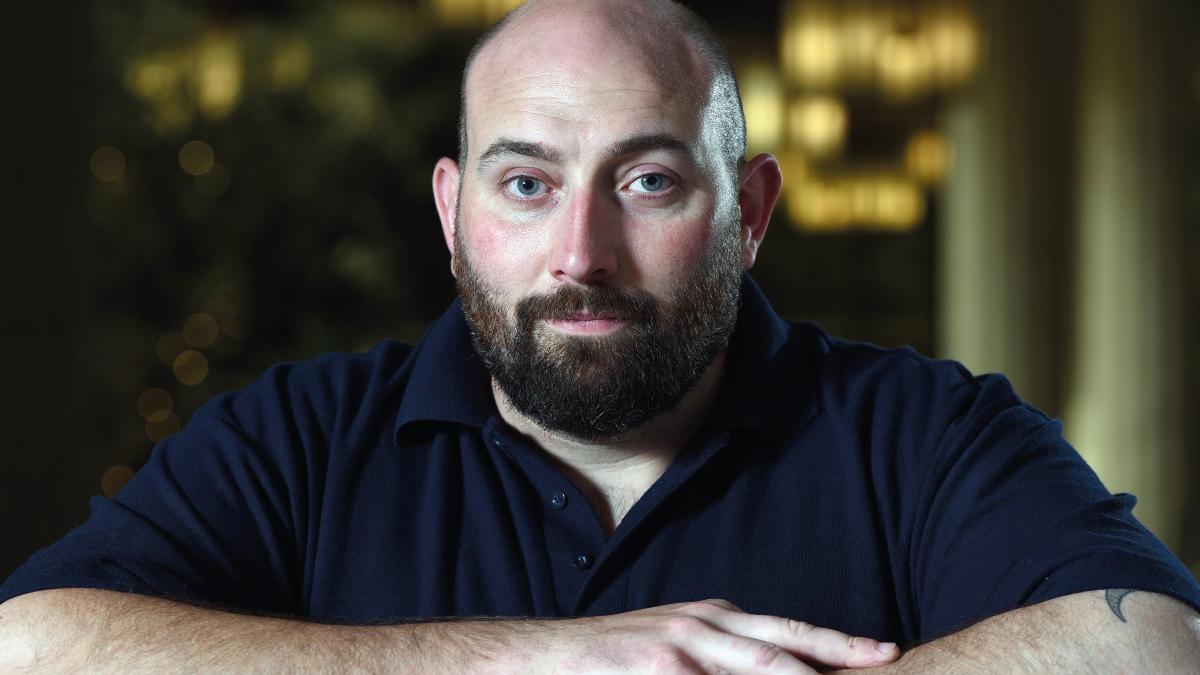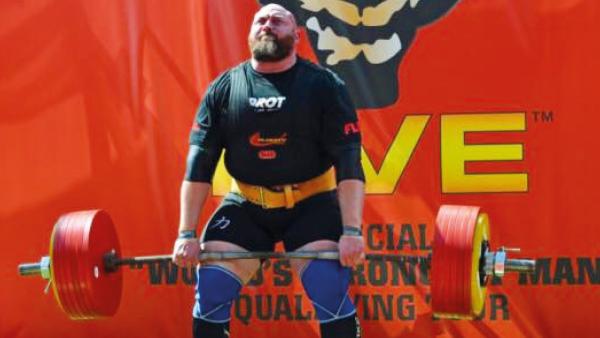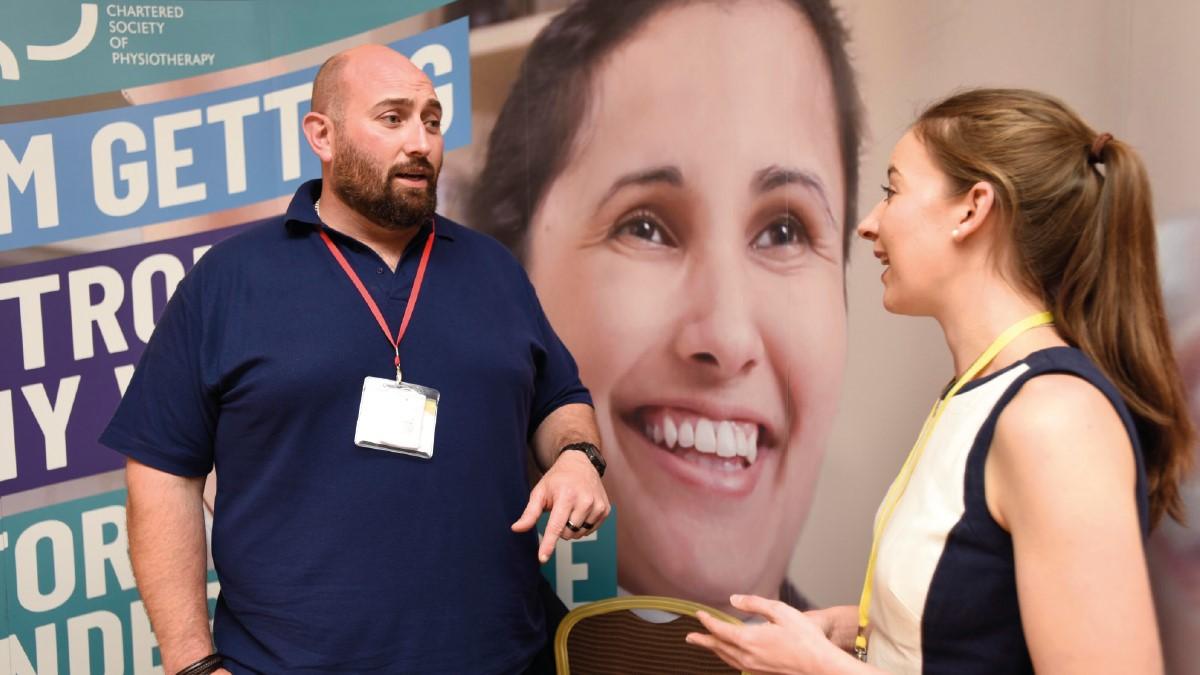Lloyd Renals, an MSK physio and former World’s Strongest Man competitor, tells Robert Millett why he’s committed to sharing the strengths of the Stronger My Way online hub

How long have you been a physio and what’s your current role?
I qualified in 2009 from Brighton University and have continued to work at what is now called University Hospitals Sussex NHS Trust, based mostly at Worthing hospital. After completing my rotation I specialised in MSK and went on to complete an MSc in Strength and Conditioning in 2017.
I currently have a split role, working half my week as the staff physiotherapist for the trust – dealing with MSK issues mostly – and in my other role I work as MSK team lead within paediatrics.
In addition to these, I am also a CSP steward and part of the health and wellbeing group within the trust, where we discuss and implement initiatives to support our staff – whether that be exercise groups, mindfulness courses or other wellbeing initiatives.
And when did you start using the Stronger My Way hub?
I started using it shortly after its launch in March this year, after taking some time me to review the site and learn how to navigate and find all the resources that are available.
Since then, how have you being using it with your patients?
Within my staff role I have been utilising it by mostly sharing the information with my patients, either via my smart phone or email, as it’s an open resource which makes it easier for patients to access and they can access it in their own time and then come back with any queries. Additionally, I’ve had patients with long term conditions like multiple sclerosis and persistent pain, and when I’ve asked about how they are managing with exercise and their condition it has opened up conversations about some of the underlying anxieties they’ve had and revealed that they didn’t really know what they could or couldn’t do, so it’s been nice to be able to signpost them to a reliable resource like Stronger My Way.
Do you think the resource has helped improve outcomes for your patients or improved adherence to rehab or exercise programmes?
With patients who have long term conditions it has definitely helped, as it’s increased their understanding about what kind of strengthening activities they can do with their condition, and it’s given them the opportunity to take back some control in their lives.
I’ve also had some good feedback about the resource. Patients I’ve referred to it have said they found it really helpful and are keen to engage in physical activity, which is always a good sign.
It’s definitely been helpful to be able to ask questions about their conditions and ask about physical activity, and not only have a resource that’s quick to access for myself, but one that patients can additionally access – so there’s no discrepancy in the information they are hearing from me and the information they are then able to read around.
What types of resources on the hub have you personally found most useful?
Part of my role is to support training and I’ve found the evidence base section really helpful as a go to resource, and the signposting to sites around health inequalities, national guidelines and strengthening evidence.
Given the current climate there is a nice section on long Covid, which I’ve found helpful given the lack of services to help this patient group.
Have you any advice for other physios, about how they can use the hub with their patients?
I would say first get familiar with the site and have a look around. That may mean taking a bit of time to navigate round it, but once you know what the hub has to offer and where to find all the information you’ll see how simple it is and you’ll discover a wealth of useful information on there.
It can help build your confidence with understanding the importance of physical activity, help you understand the population you work with and provide ideas to support your patients.
With both your sporting and physio background you obviously know a lot about strengthening activities – but have you found that the Hub has helped make it easier for you to communicate key ideas to patients?
Yes. It has helped with my ability to offer patients a resource that I can rely on. It’s simple for patients to use and uses language that is simple for people to understand, along with patients’ stories and exercise demonstrations. I’ve also found the evidence section very helpful for in service training sessions to gather information regarding physical activity and evidence on strengthening.
Why do you think this resource is so important/useful?
Physical activity is one of those areas that is not really spoken about but its implications are wide spread. Physical activity has been listed as the fourth largest cause of disability and disease in the UK. Worldwide the percentage of deaths related to physical inactivity is per cent and in the UK its 9.6 per cent! And this increases with people living with long term conditions. There is a growing trend in sedentary lifestyles and sadly the recent pandemic hasn’t helped, as the data shows there has been a 3 per cent drop in physical activity prevalence. There is strong evidence that physical activity reduces depression by 30 per cent, hypertension by 30 per cent, breast cancer 20 per cent, type 2 diabetes by 40 per cent, falls prevention by 30 per cent and the list goes on and on.
The NHS is one of the best public health care services globally; however I always feel like we are putting a bandage over the problem once it has occurred. We need to reverse our thinking and put more emphasis on preventative measures rather than management and encourage proactivity and physical activity. Stronger My Way gives us a good basis and a good source of information to start engaging patients to take more control of their health – and to protect both our patients and our NHS.
Additionally, I’m aware that undergraduate and post graduate courses in physiotherapy don’t always offer a great deal of information or teaching in exercise therapy and physical activity and for those that feel anxious of exercise from an assessment, prescription, management and information perspective this is a great resource to build your confidence.
Is that why you’ve chosen to become a Stronger My Way ambassador?
Yes. Exercise has always been an area of interest to me, both personally and professionally, and exercise is a core treatment we offer our patients. There is also growing evidence for its benefits for our wellbeing and for those that have MSK and/or long-term conditions. So I believe this is a really great initiative, as it’s a very knowledgeable hub that provides a good resource for both patients and therapists.
From strongest man to Stronger My Way
How did you get involved in strongman contests and the World’s Strongest Man competition?
After my physiotherapy degree I increased my interest in exercise and strength training and started training with a friend who competed in strong man contests. We used to train in the week at a local gym in Hove, and then we’d travel over to Fareham where there was a Strongman specific gym owned by Rob Frampton who additionally competed in World’s Strongest Man competitions. So we use to build our knowledge and experience with him and develop our core strengthening locally. It started as a hobby and a bit of fun, which also helped my exercise therapy skills as a physiotherapist, so it was a win-win as far as I was concerned. I then entered a few novice competitions, not knowing if I would enjoy the competitive aspect of it and this developed, and one day I won England’s Strongest Man in 2011.

Following this I came second at UK’s Strongest Man 2012, then won London’s Strongest Man in 2013 and later that year went to compete at World’s Strongest man in China.
In 2014 I decided to retire from the sport for personal reasons and the reality that, I wasn’t going to leave my career and to continue and maintain I was going to have to consider working less as a physiotherapist. So ultimately something that started out as a bit of fun got very serious very quickly and I was very lucky and fortunate to get as far as I did in that short period and to travel the world.
How much training and preparation was involved?
The training itself was tough and the diet was harder to be honest. I would train 5-6 times a week, usually for two hours most evenings in the gym and 4-5 hours on a Saturday. I was eating anywhere between 6,000-10,000 calories a day, eating every 2-3 hours if possible – including having to wake up during the night. On top of that, trying to get funding and sponsorship was additionally hard – as I needed funds to train, eat and travel to compete and those were aspects I never really considered when I first got involved.
Motivation wise, initially it was self-interest and helpful to me clinically for my patients. As it turned more serious the main driver was that to me, there wasn’t anything more impressive than being crowned the strongest man in the world. I just thought it was an awesome title, however the reality and road to that title required so much more than I could offer to be honest, especially knowing I could never give up my career as a physio.
Become a Stronger My Way ambassador

We’re looking for CSP members to join our community of ambassadors to help us spread the word about our Stronger My Way online hub. What is a Stronger My Way ambassador? As a Stronger My Way ambassador, we encourage you to use the hub’s resources to reach out to other audiences beyond the patients you see so that your colleagues and other healthcare professionals get to hear about it. By doing this you can also meet your CPD needs
What do ambassadors do?
Here’s some of the ways you could support us as a Stronger My Way ambassador:
- Organise a peer-to-peer learning opportunity e.g. put Stronger My Way on a meeting agenda in your workplace and highlight the resources to colleagues.
- Initiate a teaching session for other healthcare professionals adapting it to your audience or weave it into in-service training.
- Share our campaign messages on social media.
- Promote the hub resources to key local stakeholders e.g. social prescribers or influential contacts in your workplace or local area.
- Run a strengthening event or give a talk in your local community or with a local employer.
Who can become an ambassador?
All CSP members are encouraged to think about becoming an ambassador and to promote the hub where they work or learn.
How becoming an ambassador can help you in your personal development.
Depending on your chosen activity, you might find that becoming a Stronger My Way ambassador can help you develop a range of exciting new skills, such as:
- Influencing/mentoring a range of audiences, from patients and peers to other health professionals and key decision makers.
- Enhancing your leadership abilities by using your knowledge to develop others.
- Effective communications and networking, including presenting your message clearly to the right people and ensuring that it has practical impact.
Once you have finished your activities, complete the reflective form on our virtual learning environment (VLE) to reflect on your development and impact. You will then receive a Stronger My Way certificate.
How to become an ambassador
Start by watching the short Stronger My Way launch webinar to get familiar with the hub and watch the ambassador videos on this page for ideas on how to promote Stronger My Way. Visit: bit.ly/3xrooS9
Find Out More
Number of subscribers: 2




































